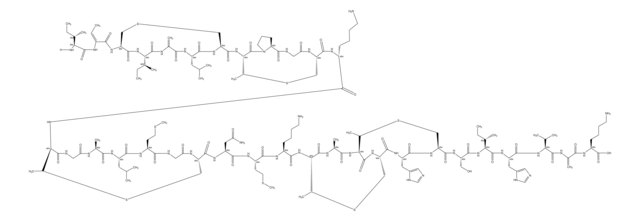63978
(RS)-(Methylenecyclopropyl)acetic acid
analytical standard
Zaloguj sięWyświetlanie cen organizacyjnych i kontraktowych
About This Item
Wzór empiryczny (zapis Hilla):
C6H8O2
Numer CAS:
Masa cząsteczkowa:
112.13
Beilstein:
1927126
Numer MDL:
Kod UNSPSC:
85151701
Identyfikator substancji w PubChem:
Polecane produkty
klasa czystości
analytical standard
Poziom jakości
Próba
≥95.0% (HPLC)
okres trwałości
limited shelf life, expiry date on the label
metody
HPLC: suitable
gas chromatography (GC): suitable
Zastosowanie
food and beverages
format
neat
temp. przechowywania
−20°C
ciąg SMILES
OC(=O)CC1CC1=C
InChI
1S/C6H8O2/c1-4-2-5(4)3-6(7)8/h5H,1-3H2,(H,7,8)
Klucz InChI
QJBXAEKEXKLLLZ-UHFFFAOYSA-N
Powiązane kategorie
Zastosowanie
(RS)-(Methylenecyclopropyl)acetic acid (MCPA), an inhibitor of multiple acyl-CoA dehydrogenase enzymes, is derived from hypoglycin A metabolism. MCPA forms non-metabolizable carnitine and coenzyme A (CoA) esters thereby depressing tissue levels of these cofactors and making them less available for other biochemical reactions. (RS)-(Methylenecyclopropyl)acetic acid may be used as a reference material during the analysis of MCPA.
Hypoglycin A is metabolized by means of transamination and oxidative decarboxylation to methylene cyclopropyl acetic acid (MCPA). MCPA forms nonmetabolizable carnitine and coenzyme A (CoA) esters, thereby depressing tissue levels of these cofactors and making them less available for other biochemical reactions.
Refer to the product′s Certificate of Analysis for more information on a suitable instrument technique. Contact Technical Service for further support.
Opakowanie
Bottomless glass bottle. Contents are inside inserted fused cone.
Polecane produkty
Find a digital Reference Material for this product available on our online platform ChemisTwin® for NMR. You can use this digital equivalent on ChemisTwin® for your sample identity confirmation and compound quantification (with digital external standard). An NMR spectrum of this substance can be viewed and an online comparison against your sample can be performed with a few mouseclicks. Learn more here and start your free trial.
This page may contain text that has been machine translated.
Hasło ostrzegawcze
Warning
Zwroty wskazujące rodzaj zagrożenia
Klasyfikacja zagrożeń
Acute Tox. 4 Oral - Skin Irrit. 2
Kod klasy składowania
10 - Combustible liquids
Klasa zagrożenia wodnego (WGK)
WGK 3
Temperatura zapłonu (°F)
Not applicable
Temperatura zapłonu (°C)
Not applicable
Wybierz jedną z najnowszych wersji:
Masz już ten produkt?
Dokumenty związane z niedawno zakupionymi produktami zostały zamieszczone w Bibliotece dokumentów.
Hypoglycin and metabolically related inhibitors.
D Billington et al.
Methods in enzymology, 72, 610-616 (1981-01-01)
Y K Lieu et al.
The American journal of physiology, 272(3 Pt 1), E359-E366 (1997-03-01)
To examine the changes in coenzyme A profile and the possible corrective effects of carnitine supplementation in the genetic disorders of mitochondrial beta-oxidation, we carried out experiments using an inhibitor of multiple acyl-CoA dehydrogenase enzymes, methylenecyclopropaneacetic acid (MCPA), in rat
K Y Tserng et al.
Biochemistry, 30(44), 10755-10760 (1991-11-05)
To study the structure-activity relationship between pentanoic acid analogues and the inhibition of fatty acid oxidation, a number of 4-pentenoic and methylenecyclopropaneacetic acid derivatives were prepared. All compounds inhibited palmitoylcarnitine oxidation in rat liver mitochondria, with 50% inhibition occurring at
Methylenecyclopropaneacetic acid, a metabolite of hypoglycin.
C Von Holt
Biochimica et biophysica acta, 125(1), 1-10 (1966-08-03)
The antagonism of the toxicity of hypoglycin by glycine.
S S Al-Bassam et al.
Biochemical pharmacology, 30(20), 2817-2824 (1981-10-01)
Nasz zespół naukowców ma doświadczenie we wszystkich obszarach badań, w tym w naukach przyrodniczych, materiałoznawstwie, syntezie chemicznej, chromatografii, analityce i wielu innych dziedzinach.
Skontaktuj się z zespołem ds. pomocy technicznej





